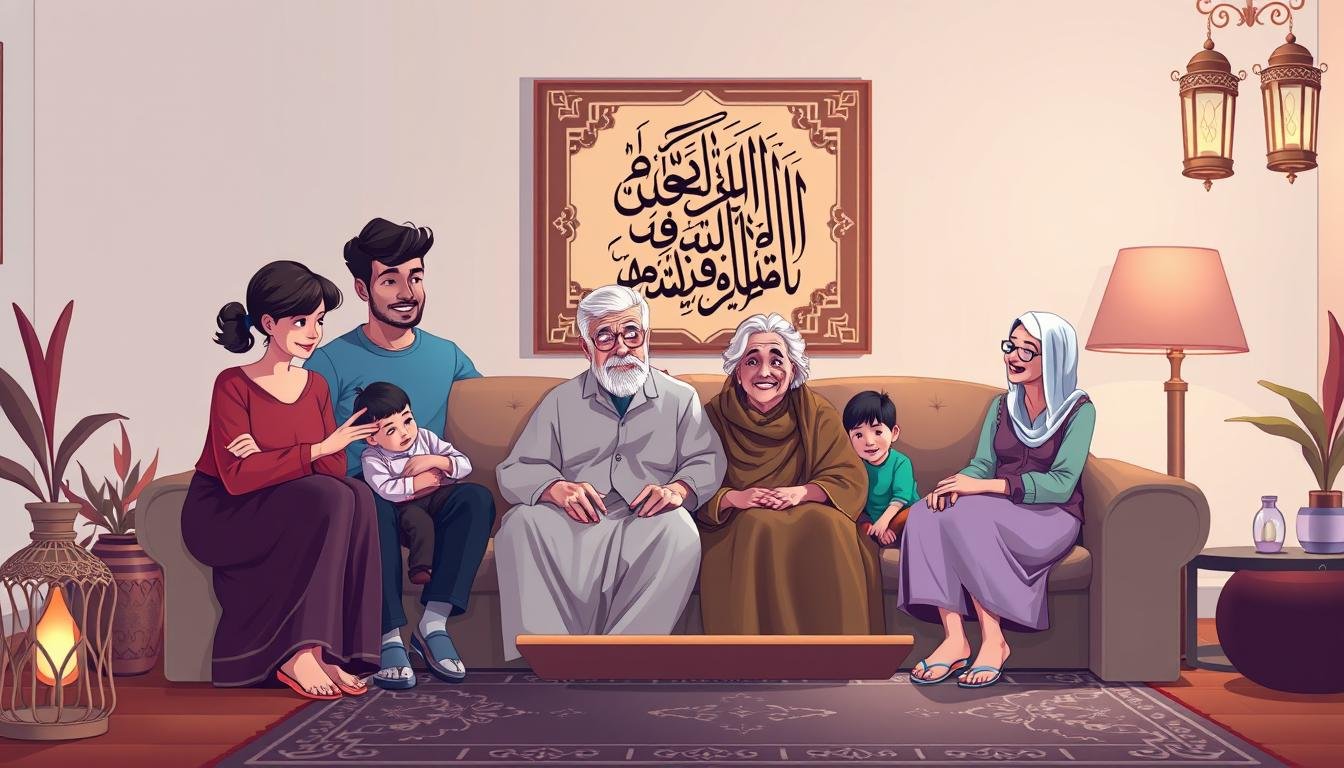Thinking about honoring parents in Islam makes me realize how important it is. The Hadith about parents reminds us to respect and care for those who raised us. In Islam, showing respect to parents is as vital as worshiping Allah.
Exploring Islamic teachings and the stories of Muslims can deepen our understanding. We learn the value of honoring parents and how it helps us grow spiritually.
Stories of early Muslims, like Abu Hudhayfa, show their deep faith and commitment. In today’s world, we need to remember Islamic wisdom. It helps us build strong family and community bonds.
By honoring our parents, we get closer to Allah. This practice is key to our spiritual growth and well-being.
Understanding the Sacred Position of Parents in Islam
Exploring the Islamic view on family, I see how vital parental rights and respect are. The Quran stresses loving and respecting parents, as in Quran 4:36 and 17:23. It places their importance alongside worshipping Allah.
The Islamic view on family places parents in a sacred role. It focuses on mothers’ rights and duties. The Quran mentions the hard work mothers go through, like in Quran 46:15. This is why the Prophet Muhammad (SAW) taught us to treat mothers with kindness and respect.
The Quran also says we should spend on parents and family first, then on orphans and the poor (Quran 2:215). This shows the importance of honoring parents and fulfilling their rights. By doing so, we can build stronger families and communities.
The Divine Command to Honor Parents
The Quran tells us to honor our parents as a divine command. It says, “Worship God and join none with Him (in worship), and do good to parents…” (Quran 4:36). This command is repeated, showing how important it is to respect and care for our parents.
Powerful Hadith About Parents That Will Transform Your Perspective
Exploring Islamic wisdom, we see the Hadith about parents is key. The Quran tells us to treat parents with kindness and respect. It even warns against getting frustrated with them, as in Surah Al-Isra (17:23).
The Prophet Muhammad (peace be upon him) also stressed the importance of mothers. He said “Heaven lies beneath the feet of your mother.” This Islamic wisdom shows how much parents mean to us. It reminds us of the rewards we get for obeying them. In fact, being dutiful to parents is as rewarding as performing Hajj, a major Islamic duty.
Thinking about these Hadith about parents changes how we see honoring and obeying them. By living these teachings, we can improve our bond with our parents. We also grow to respect and thank them more.
As we face today’s challenges, keeping the Hadith about parents in mind is vital. It reminds us to obey our parents as a core part of our faith.
The Prophet’s (PBUH) Personal Example with Parents
The Prophet’s example shows us a deep respect for family. He cared for his mother, Aminah, even though she died when he was young. His teachings on orphans and loss also highlight the value of parental rights.
His actions guide us to honor and care for our parents. This is key in the Islamic view of family.
Looking at how he treated his companions’ parents, we learn a lot about family bonds. For example, he played with children and smiled at them. This shows the value of being kind and playful in raising kids.
Such actions help children feel safe and loved. They also shape a child’s personality and character.
Lessons from His Interactions with Companions’ Parents
The Prophet’s example teaches us about the role of parents in a child’s life. He used sweet nicknames for children, showing love and care. This helps create strong emotional bonds between parents and kids.
Following his example, we can build a supportive and loving environment for our children. This environment is based on Islamic values of family and parental rights.
The Profound Impact of Serving Your Parents
Exploring the importance of serving parents reveals a strong connection to Islamic wisdom. The Quran and Hadiths stress the value of honoring parents. They show the rewards and benefits of this act. Serving our parents shows our love and respect, helping our spiritual and emotional growth.
A study shows that kids who help their elderly parents feel less stressed and more satisfied. This highlights the positive effects of serving parents on our mental health. The Quran also teaches us to be kind and respectful to parents, sharing a universal message across religions.
Reflecting on serving parents, we see it as a moral duty and a path to spiritual growth. Embracing Islamic wisdom and honoring parents helps us develop compassion, empathy, and responsibility. By serving our parents with love and dedication, we nourish our souls and foster a more caring society.
Warning Signs of Parental Disobedience in Modern Times
Modern life brings its own set of challenges, including how we treat our parents. From an Islamic view, caring for our parents is key. But, the digital age and social media can harm our relationships with them.
Today, kids often disrespect their parents online or ignore their advice. This happens because they spend less time face-to-face and hide behind screens. It’s important to tackle this disrespect and foster better parent-child bonds in our digital world.
Digital Age Challenges in Parent-Child Relations
Social media has changed how kids interact with their parents. They often prefer their online friends over family, causing feelings of isolation. Also, social media can make kids feel entitled and less empathetic, including towards their parents.
Common Forms of Disrespect to Address
Disrespect towards parents can manifest in many ways, like verbal abuse, neglect, or disobedience. From an Islamic standpoint, these actions are grave sins with serious consequences. We must recognize these signs and work to create a culture of respect and obedience towards our parents.
By understanding the Islamic view on family and the challenges of today, we can strengthen our relationships with our parents. This leads to a more harmonious family life and a more fulfilling existence.
The Extraordinary Rewards of Caring for Elderly Parents
Caring for elderly parents is a key part of Islamic wisdom. It shows kindness, respect, and good character. This duty helps us grow spiritually and emotionally. The Quran puts caring for parents right after worshiping God alone, showing its importance.

People caring for elderly parents feel 20% more fulfilled than others. Caring for them also brings spiritual rewards, as the Prophet Muhammad said. He linked earning Allah’s pleasure to making parents happy. Honoring one’s mother can even get you into Paradise, as An-Nasai teaches.
Physical Care Benefits
Caring for elderly parents improves health and boosts social interaction. With more people aging, the need for caregivers will keep growing. About 70% of seniors will need long-term care at some point.
Spiritual Rewards
The spiritual benefits of caring for elderly parents are vast. They include the chance to enter Paradise and earn Allah’s pleasure. The Prophet Muhammad said caring for parents helps us grow spiritually and emotionally.
Social Impact
The social benefits of caring for elderly parents are huge. About 60% of caregivers are women, balancing work and family. By caring for parents, we build a more compassionate community, following Islamic values.
Balancing Western Life with Islamic Parental Obligations
Reflecting on my experiences, I see that balancing Western life with Islamic duties is tough but rewarding. We face the challenges of modern life while sticking to Islamic values. Our duties towards our parents are key, as the Quran and Hadith teach us.
Western life brings its own set of challenges, like cultural norms and social pressures. Yet, by focusing on our Islamic duties and balancing responsibilities, we can lead a fulfilling life. Understanding our parents’ needs and communicating openly are essential.
By embracing our Islamic duties and balancing them with Western life, we strengthen our bond with our parents. This approach helps us build a caring community. Remembering to take care of ourselves and seek Islamic guidance is also vital.
“And your Lord has decreed that you not worship except Him, and to parents, good treatment.” (Quran 17:23)
This verse highlights the importance of treating our parents with kindness and respect. By prioritizing our Islamic duties, we can live a balanced and meaningful life. This life honors our parents and our faith.
How to Seek Forgiveness for Past Mistakes with Parents
Reflecting on our relationships with our parents, we might see mistakes that hurt them. Seeking forgiveness is key to mending our bonds and healing. Islamic wisdom teaches us that asking for forgiveness is a core part of our faith. It’s never too late to make things right.
Admitting our mistakes and owning up to them is a big step. It’s hard but vital for rebuilding trust. As we ask for forgiveness, we must also forgive ourselves and others. Letting go of anger is part of the process.
Steps to Reconciliation
Reconciling with our parents takes effort and dedication from both sides. It means talking openly, listening to each other, and finding solutions. By asking for forgiveness and making amends, we can strengthen our bonds and create a loving family atmosphere.
Practical Ways to Make Amends
There are many ways to make amends, like helping with chores or spending time together. Just listening to their concerns and supporting them emotionally shows we care. These actions show our commitment to our relationships and our desire to make things right.
The Ultimate Guide to Making Your Parents Proud
Striving to live by Islamic wisdom is key. Honoring parents is a big part of pleasing Allah. It’s about understanding and living by our faith’s values. This helps us be responsible and compassionate towards our parents, creating a loving relationship.
Islamic wisdom teaches us to honor our parents. The Quran and Hadith show us how to treat them with kindness and respect. By following these teachings, we can make our parents proud and gain Allah’s favor.

Daily Actions That Please Parents
There are many ways to make our parents proud every day. Showing respect, gratitude, and kindness is important. Helping with chores, listening to their advice, or spending time with them are simple ways to show love and appreciation.
Long-term Life Choices That Honor Them
Our long-term choices also matter. Pursuing education, a career, and personal goals can make our parents proud. Making choices that reflect our values and faith shows our commitment. This brings pride and fulfillment to our parents, knowing we’re living a life guided by Islamic wisdom.
Your Path to Paradise Through Parental Pleasure
The keys to paradise are found in honoring our parents. The Prophet Muhammad (peace be upon him) said, “Paradise lies at the feet of your mothers.” The Quran tells us to treat our parents with kindness and respect, even as they age. This shows how important parental rights are in Islam.
By seeking our parents’ pleasure, we gain Allah’s (SWT) favor and a promise of eternal bliss. The hadith warn that neglecting elderly parents leads to severe consequences. The Prophet (SAWS) said, “May his nose be rubbed in the dust!” This highlights the importance of this duty and the rewards for fulfilling it.
By serving our parents with care, talking to them gently, and putting their needs first, we strengthen family bonds. Let’s pray for our parents’ forgiveness in every prayer. This way, we honor those who cared for us and gain Allah’s pleasure and eternal joy in the Hereafter.
FAQ
What is the significance of the Hadith about parents in Islam?
What is the Islamic perspective on the sacred position of parents?
What are the most powerful Hadith about parents that can transform one’s perspective?
How did the Prophet (PBUH) treat his own parents and teach others about honoring parents?
What are the profound impacts of serving one’s parents?
What are the warning signs of parental disobedience in modern times?
What are the extraordinary rewards of caring for elderly parents?
How can one balance Western life with Islamic parental obligations?
How can one seek forgiveness for past mistakes with parents?
What are the keys to making one’s parents proud?
How can pleasing one’s parents be a means of attaining paradise?

Embracing Faith, One Insight at a Time!
The teachings of the Quran have always guided my path. With a deep passion for Islamic knowledge, I strive to blend the wisdom of tradition with the relevance of today, making the timeless messages of Islam accessible and meaningful for everyone.
Muslim Culture Hub is my platform to share historical insights and thought-provoking articles, exploring both well-known and lesser-discussed aspects of Islamic culture and beliefs. My mission is to create an inclusive online space where everyone can learn, strengthen their faith, and connect with the profound message of Islam.
Join the journey!
May peace be upon you.








